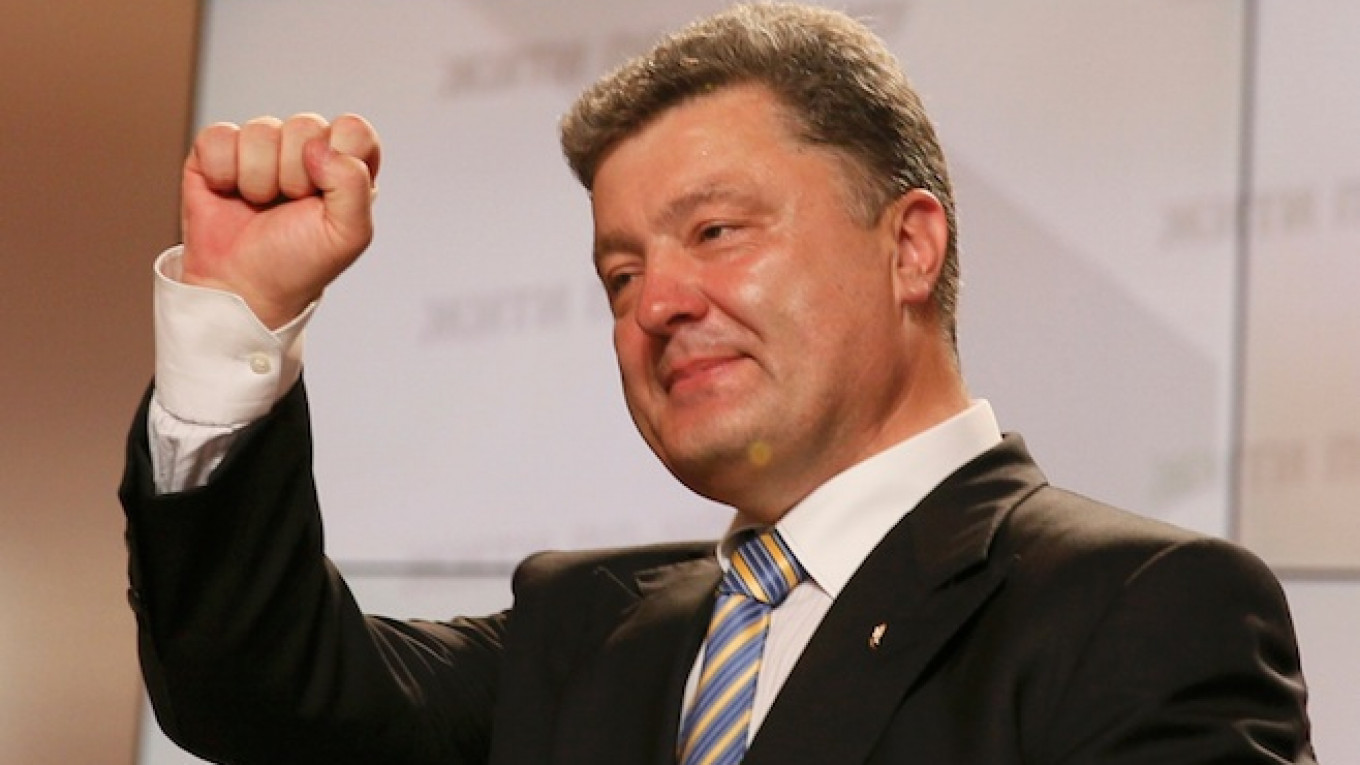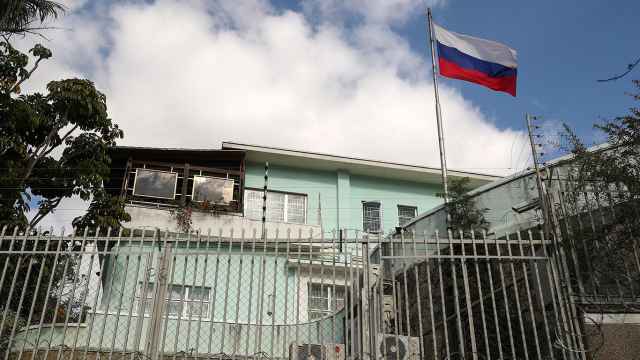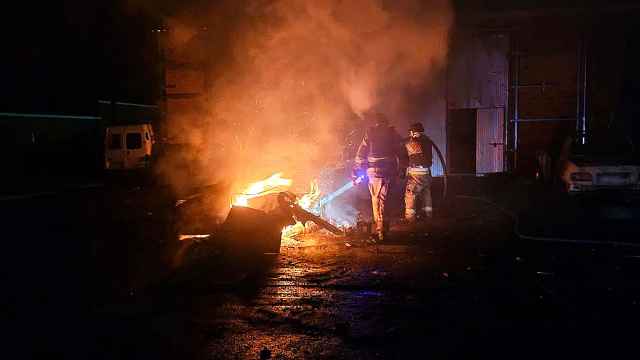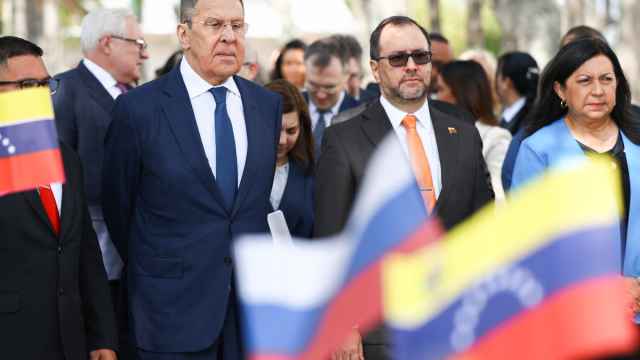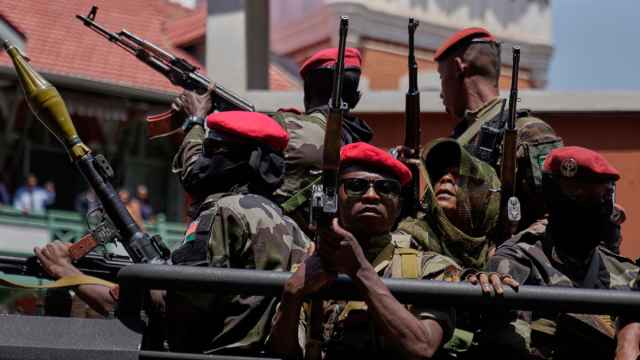Petro Poroshenko, a billionaire chocolate manufacturer, has claimed the Ukrainian presidency with an emphatic election victory, taking on a fraught mission to quell pro-Russian rebels and steer his fragile nation closer to the West.
A veteran survivor of Ukraine's feuding political class who threw his weight and money behind the revolt that brought down his Moscow-backed predecessor three months ago, the burly 48-year-old won 55 percent in exit polls on Sunday's first-round ballot marred by the reality that millions were unable to vote in the troubled eastern regions.
Results will not be announced until later Monday but runner-up Yulia Tymoshenko, on 13 percent, made clear she would concede, sparing the country a tense three weeks until a runoff round.
Poroshenko, known as the "Chocolate King," has no time to lose to make good on pledges to end the "war" with separatists in the Russian-speaking east, negotiate a stable new relationship with Moscow and rescue an economy sapped by months of chaos and 23 years of post-Soviet mismanagement and chronic corruption.
The size of his victory reflects in part Ukrainians rallying behind the front-runner in the hope of ending a political vacuum that Russian President Vladimir Putin has exploited to annex the Crimea peninsula and offer solidarity, and maybe more, to rebels in the east who want to break with Kiev and accept Russian rule.
In the eastern Donbass coalfield, where militants ensured polling stations were closed to some 10 percent of the national electorate, rebels scoffed at the "fascist junta" and announced a plan to "cleanse" their "people's republic" of "enemy troops". A minister in Kiev said in turn its forces would renew their "anti-terrorist operation" after a truce during the polling.
More than 20 people were killed in the region last week.
East-West Conundrum
Claiming a popular mandate for a resumption of efforts to bind the nation of 45 million into association with the European Union — a drive that triggered the whole crisis six months ago — Poroshenko said he was ready to negotiate with Putin and called Russia a vital partner. He insisted Crimea must be returned.
Yet it remains unclear how the tycoon can square the circle of turning firmly westward as long as Russia, Ukraine's major market and vital energy supplier, seems determined to maintain a hold over the second most populous ex-Soviet republic, occupying a vast swathe of the borderlands between East and West.
Nor is it clear that Poroshenko has new answers to resolving the uprising in the industrial east, given the weakness of his forces and the threat of Russian military intervention — a threat that has raised fears of a new Cold War, or worse, and has been met by only tentative U.S. and EU economic sanctions.
Declaring that his first trip would be to the Donbass, Poroshenko said he was ready to negotiate with anyone, and to offer the kind of regional autonomy, Russian language rights and budgetary powers that many want in the east.
"To people who have taken up arms but are not using them, we are ready to give amnesty," he told a news conference at which he fielded questions in a fluent mix of Ukrainian, Russian and English. "As for those who are killing, they are terrorists and no country in the world conducts negotiations with terrorists."
Poroshenko can be sure of a welcome from the EU and U.S., with President Barack Obama hailing the election as a step toward restoring Ukrainian unity. But although Putin told an international audience at the weekend that he was ready to work with a new Ukrainian administration, Russia may use the gaps in the election in the east to question its legitimacy.
A senior member of Putin's party, deputy parliamentary speaker Sergei Neverov, gave a taste of that when he wrote on Facebook: "It is hard to recognize the legitimacy of elections when tanks and artillery are wiping out civilians and a third of the population is driven to the polling stations at gunpoint."
He ridiculed Western leaders for endorsing the vote.
In a statement, Obama did not preempt the results by naming Poroshenko but he praised Ukrainians for turning out to vote despite the threats. He called the election "another important step forward in the efforts of the Ukrainian government to unify the country and reach out to all of its citizens to ensure their concerns are addressed and aspirations met."
Experienced Hand
Poroshenko is hardly a new face in Ukrainian politics, having served in a cabinet under Yanukovych and also under previous governments led by Yanukovych's foes. This breadth of experience has given him a reputation as a pragmatist capable of bridging Ukraine's divide between supporters and foes of Moscow.
A former national security council chief, foreign minister and trade minister, he was a strong backer of the protests that toppled Yanukovych and is thus acceptable to many in the "Maidan" movement who have kept their tented camp in the capital to keep pressure on the new leaders to honor their promises.
Constitutional changes since Yanukovych's fall will leave Poroshenko with less power than his predecessor. He will share duties with Prime Minister Arseny Yatseniuk and parliament.
Poroshenko, who has worked closely with the liberal Yatseniuk in recent months, said there should be a parliamentary election before the end of the year — though he also said that it should not take place before conflict in the east was over.
Poroshenko and former prime minister Tymoshenko traded accusations of corruption when both were in government following the "Orange Revolution" of 2004-05 that thwarted Yanukovych's first bid for the presidency. But many voters saw him as less culpable than many in Ukraine of enriching himself illegally.
Where many "oligarchs" across the former Soviet Union took control of huge, formerly state-owned assets in the 1990s, many credit Poroshenko with building his Roshen confectionery empire himself. His other interests include a major television news channel.
"He's a serious person who built up his business himself," said Olga Netreba, 54, a civil servant in the industrial city of Dnipropetrovsk who said she had voted for him. "He knows economics and I think he didn't steal his money but earned it.
"I expect that with him Ukraine will be in Europe, that we will finally start getting towards Europe, so that living standards rise and Ukraine never returns to dictatorship."
See also:
Ukraine Holds Presidential Vote; Rebels Block It
Moscow Unlikely to Ease Up on Ukraine After Vote, Experts Say
A Message from The Moscow Times:
Dear readers,
We are facing unprecedented challenges. Russia's Prosecutor General's Office has designated The Moscow Times as an "undesirable" organization, criminalizing our work and putting our staff at risk of prosecution. This follows our earlier unjust labeling as a "foreign agent."
These actions are direct attempts to silence independent journalism in Russia. The authorities claim our work "discredits the decisions of the Russian leadership." We see things differently: we strive to provide accurate, unbiased reporting on Russia.
We, the journalists of The Moscow Times, refuse to be silenced. But to continue our work, we need your help.
Your support, no matter how small, makes a world of difference. If you can, please support us monthly starting from just $2. It's quick to set up, and every contribution makes a significant impact.
By supporting The Moscow Times, you're defending open, independent journalism in the face of repression. Thank you for standing with us.
Remind me later.


